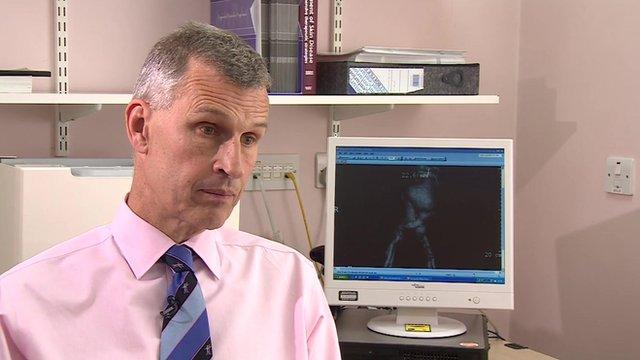Bowel disease A-to-Z guide launched
- Published

Bowel disease covers a wide range of conditions
Patients with bowel disease are to be able to access an A-to-Z guide to help them find a specialist doctor.
Bowel disease covers a wide range of conditions from cancer and irritable bowel syndrome to incontinence.
The guide, external, on the Association of Coloproctology of Great Britain and Ireland's website, allows patients to search for doctors expert in their condition.
It gives details of the medics' performance and where they work from.
This is the first guide of this type to be launched.
'Bewildering experience'
Association president Karen Nugent said: "Being diagnosed with a serious illness or disease can be life-changing and bewildering experience.
"We want to give patients the information they need, so they can easily find a surgeon who specialises in their condition.
"This will empower people to choose a surgeon they have full confidence in and make sure they are being referred to the right doctor for their individual needs, which will increase transparency."
Mark Coleman, a colorectal surgeon based in Plymouth, who helped develop the website, said: "The direction of travel for hospital specialists is to establish a better connection with patients, and also between primary and secondary care. Performance outcomes are part of that.
"When we spoke to people about designing the website they told us an A-to-Z of specialists would be useful, so someone with a particular colorectal condition could see who has the right expertise, and this could inform their discussion with their GP."
Reassurance
Prof Norman Williams, president of the Royal College of Surgeons, said: "Patients should have access to as much information as possible about their condition so they can make an informed decision about what treatment options exist and the likely outcomes."
Mark Flannagan, chief executive of the charity Beating Bowel Cancer, said: "We know that patients have a thirst for information, but it can often be difficult for them to access it during what can be a frightening time in their lives.
"This is a positive step forward in providing patients with the information they need and promoting transparency."
He added: "This is the start and as more information becomes available, we hope it will develop into what can be a valuable and user-friendly tool to help patients find the right surgeon, compare outcomes, and give them the reassurance they need."
- Published5 July 2013

- Published16 May 2013

- Published28 June 2013

- Published28 June 2013

- Published14 June 2013
